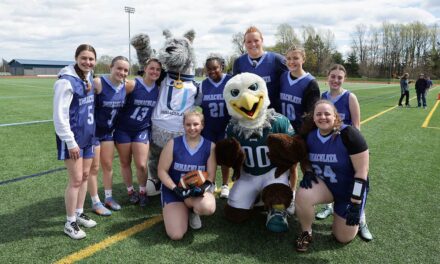By Lydia Szyjka
In the 1968 science fiction film “2001: A Space Odyssey,” HAL 9000 (a sentient artificially intelligent supercomputer system) takes over the spacecraft on a secret mission to investigate a recently found artifact on Jupiter. When Dave, the last remaining astronaut, is locked out of the ship, he asks HAL to let him back aboard. HAL famously replies, “I’m sorry, Dave. I’m afraid I can’t do that.”
Over 50 years have passed since the movie portrayed this dystopian view of artificial intelligence, but what exactly is artificial intelligence or “AI”?
Defining Artificial Intelligence
Artificial intelligence is an ambiguous term, but the simplest definition is that AI is machines, mostly computers, that simulate human intelligence. These machines learn through data fed to them during their training and then generate unique content such as images, video, text and speech. It’s interesting to note that AI often lacks the ability to explain and be transparent with how predictions and decisions are made. Regardless, businesses use AI to help make data-driven decisions, improve efficiency and speed in their hiring decisions, organize and analyze data and so much more. According to Justin McGill’s 2023 web article in Content @ Scale, there are hundreds of thousands of artificial intelligence tools, with companies creating more daily.
AI in the Workplace
The use of AI for businesses has proliferated with the launch of ChatGPT and others such as ClickUp, Notion, Wordtune and Gemini. Many of these tools incorporate generative AI, which understands and generates human-like text based on the inputs it receives via prompts. Generative AI’s popularity stems from its proficiency in engaging in conversations, answering questions and assisting users with a wide range of tasks.
However, even with massive amounts of up-to-date data and descriptive prompts, generative AI tools can fail spectacularly. Users have found that the output they provide are often inaccurate, outdated and can also include unintentional biases. With this in mind, users need to fact-check results and not rely solely on AI for capturing and managing data, conducting research, making decisions and generating content.
However, experts say that AI is only going to improve and become more powerful as it continues to feed off and learn from the massive amounts of data it consumes. It could touch every profession and area of society. In November 2023, LinkedIn reported that nearly 65% of jobs will require AI skills by 2030. With such a proliferation of AI tools, Immaculata, and universities worldwide, have a responsibility to provide AI-focused skills essential to the evolving work environment. Even though students and educators are just beginning to understand the implications and complexities of AI, there is no doubt both groups are using it or plan to use it. As such, Immaculata is educating students, faculty and staff on the ethical and moral issues surrounding AI and is guiding them on how to use the tools effectively.
AI in Education at Immaculata
In January 2024, Immaculata’s faculty members attended a mandatory in-service virtual training session on artificial intelligence for educators, presented by Sidney I. Dobrin, an author and leading expert on generative AI. Dobrin provided an overview and explained the concepts behind how AI works and some of its applications. He also discussed a topic at the top of everyone’s mind in academia: plagiarism. Dobrin contends that faculty “should be more concerned about what students will learn from an assignment and what educational purpose the assignment serves” than if students used AI. However, he added that many faculty need to rethink or redesign class assignments to limit the potential for plagiarism.
Josh Weikert, Ph.D., associate professor and chair of Immaculata’s Department of Civic Engagement, adjusted his course assessments to discourage students from using AI to plagiarize. He now has the students complete handwritten exams, give oral presentations and participate in small-group classroom discussions in place of online exams and other digital assessments he previously utilized. He also added a “responsible AI usage” segment into his thesis preparation courses to highlight areas where AI can be used effectively and ethically, such as identifying the best search terms to turn up items for a literature review.
Faculty members in Immaculata’s Division of Education are implementing ways to use AI in their classes. Kelly Doyle, Ed.D., associate professor and director of Immaculata’s undergraduate education programs, had students explore Magic School, an AI tool that helps with lesson planning, writing assessments and creating individualized education plans (IEP). Harvesting the creativity of AI, Doyle is finding fun ways for the students to interact with emerging AI teaching tools. She found a tool to use in her children’s literature class that creates a script using characters from famous children’s books so that elementary school students can act out the stories while reading the text.
Doyle’s colleague, Laura Eisemann, Ed.D., assistant professor of education, noted that many students are not very familiar with how AI tools work or the benefits of the tools. However, when students are given time and encouragement to explore and learn about AI tools, including Magic School, Eisemann expects they will be more successful in their future teaching careers.
The power of AI tools for career success extends to all industries. For example, the popularity of tools such as ChatGPT has also made writing and editing easier. In Immaculata’s Trends in Public Relations class, a key focus is on becoming familiar with using AI professionally. One assignment asked the students to create a ChatGPT account and enter descriptive prompts for ChatGPT to generate a 500-word article on the history of COVID-19 in the U.S. With this assignment, the students learned how to enter effective prompts to receive the desired output.
Alaina Gross ’25, a communication major, was one of the students who completed and shared her AI writing assignment with her classmates. She believes ChatGPT tends to follow a consistent format, reusing many words and retaining a somewhat robotic tone. However, Gross admits that ChatGPT can be helpful. When she encounters a complex topic, AI can help by summarizing it in easy-to-understand terms.
Lina Castro, director of the fashion merchandising program, encourages students to take advantage of free AI tools for their Industry Challenge course presentations to write compelling marketing messages, explain retail math problems and generate and edit inspirational images with AI tools such as Kittl. Since last year, Castro has been utilizing AI in her marketing and computer design courses.
Ashley Hopson, Immaculata’s learning support coordinator, is researching how AI can help peer tutors work with students or how it can serve as a tutoring tool for courses that do not have a human tutor available. Additionally, she and the other learning support staff use an AI tool to read tests aloud to students who are more auditory learners or who have dyslexia. Students can control the speed and the accent of the AI-generated audio and can repeat a question when needed. The potential for AI to create a more equitable learning environment could be a game-changer for many students who seek additional support.
AI in Administration at Immaculata
Aside from academics, several administrative departments are embracing AI tools to become more efficient and streamline processes. Charged with creating news and media content along with maintaining the University’s website and brand, the staff of Immaculata’s Communications and Marketing Office uses AI to support these efforts. For example, Grammarly, a free AI writing tool, helps identify grammar issues and wordy sentences. ChatGPT can suggest headlines for stories that enhance search engine optimization (SEO) to drive traffic back to the University’s website.
Furthermore, Michaella Currie, the University’s creative director, utilizes the AI tools in Adobe Photoshop to generate or remove textures and elements in photos. Photo editing tasks that had previously taken Currie up to 30 minutes manually now take less than a minute, which enables her to finish projects faster. However, she emphasizes the importance of using her professional judgment and training in the full use of design tools outside of AI.
The staff of Immaculata’s Career and Professional Development Office started using ChatGPT to determine transferable skills that alumni and career-changers can apply to different industries. Heidi Harrison, the director of the career office, also noted that the popular AI tool helps identify job titles related to academic majors. “Different prompts and criteria are entered to get just about any type of career information,” Harrison acknowledged. However, she emphasized that AI cannot take the place of the personalized service offered by the career counselors.
Adapting to AI
In a Feb. 26, 2024 Chronicle of Higher Education article, reporter Taylor Swaak asked if higher education is ready for AI. In her response, she pointed out, “Higher ed certainly adapted to the calculator. And it did evolve alongside the internet.” Immaculata has met the ever-changing needs of students for over a century, and the University is experimenting with ethical uses of AI and is ready for the changes it will bring.
Dobrin, the AI expert, stressed the need for educational institutions to address the role they will play in preparing students for career success in an AI-driven workforce. He stated, “The truth is that people will not lose their jobs to AI; they will lose their jobs to people who know how to work with AI. Those who understand how to interact with AI will thrive beyond those who don’t.”
Three Types of AI Categorized by Capability
Artificial Narrow Intelligence (also known as weak AI) is the only type of AI that exists today. Any other form of AI is theoretical. Weak AI can be trained to perform a single or narrow task, often far faster and better than a human mind can. However, it can’t perform outside of its defined task. ChatGPT and Siri are examples.
Artificial General Intelligence (AGI) is so far only a theoretical concept. It can use previous learnings and skills to accomplish new tasks in a different context without the need for human beings to train the underlying models. This ability allows AGI to learn and perform any intellectual task that a human being can.
Super AI is commonly referred to as artificial superintelligence and, like AGI, is strictly theoretical. If ever realized, Super AI would think, reason, learn, make judgements and possess cognitive abilities that surpass those of human beings. The applications possessing Super AI capabilities will have evolved beyond the point of understanding human sentiments and experiences to feel emotions, have needs and possess beliefs and desires of their own.
Information provided by the IBM Data and AI Team in October 2023.





